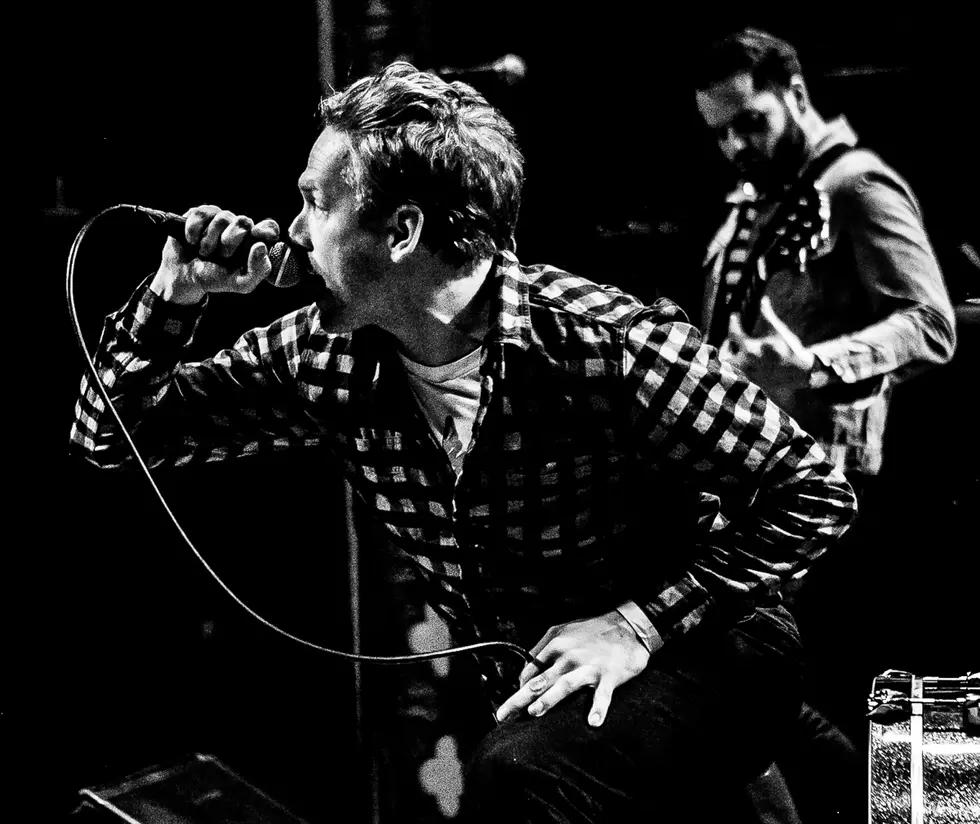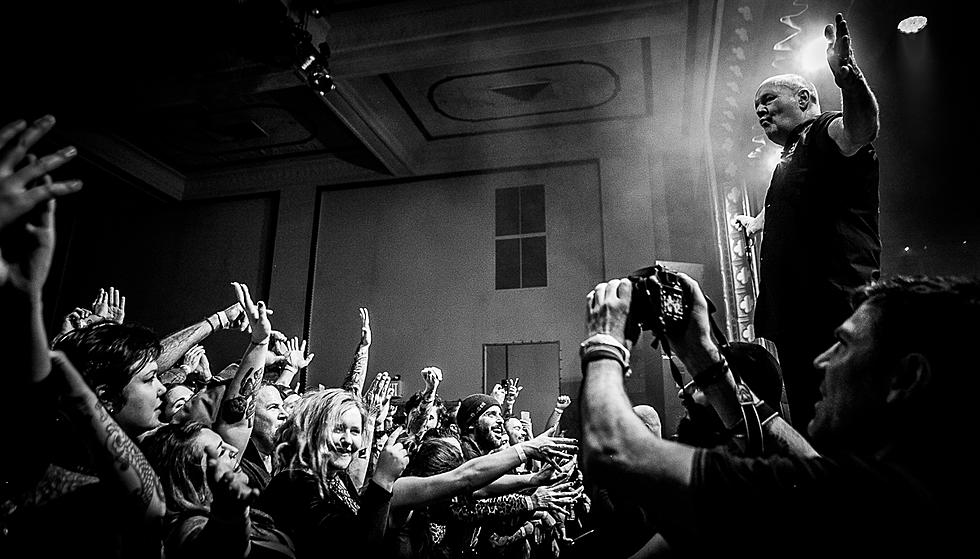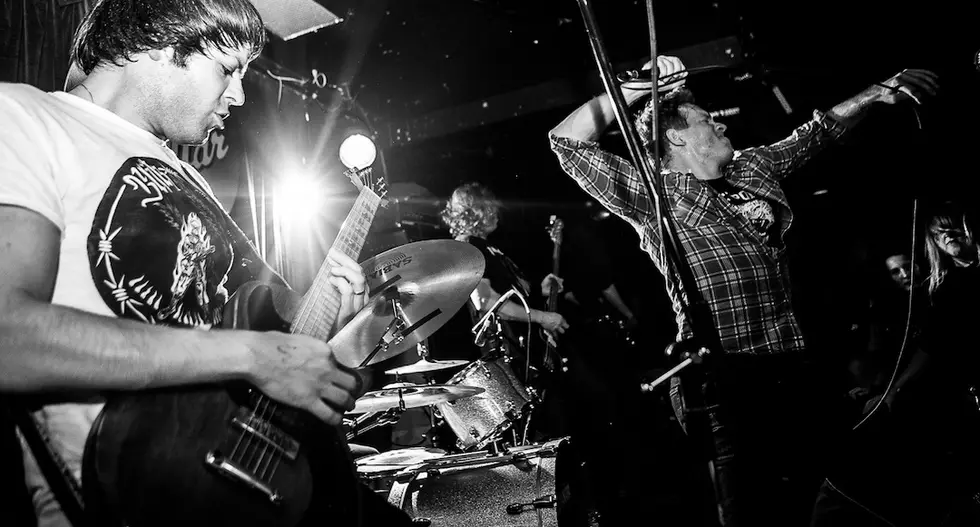
Here Comes a New Career Suicide LP! Stream ‘Row on Row’ Now
It's been years now, but in punk circles there has been a consistent and growing chorus of disapproval about one thing: Where is a new motherfucking Career Suicide record? It's understandable. Though the band released 2008's Cherry Beach EP after 2006 classic Attempted Suicide, the weight of that LP and its status as a bona fide classic within the punk community is legendary.
Guess what? The day has finally come. Career Suicide have announced the Machine Response EP and LP (two separate releases), the first of which is up for preorder now and will be available this week in Europe. Featuring three new tracks and one cover, the EP is a primer for the LP, due on Deranged in February. We have the premiere of new track "Row on Row" below.
With these exciting releases on deck, we spoke with vocalist Martin Farkas about the time away, crafting the new LP in the wake of the revered Attempted Suicide, the passing of Brandon Ferrell and more. Head below for the stream and said interview.
After a decade away, you have have a new LP, and it comes with a new 7". Give us some background on the release. Why aren't they packaged as one?
So, the LP is coming out on Deranged / Static Shock, and the 7" we are putting out ourselves. We’ve never put out a record ourselves, so for shits and giggles we figured we’d give that a shot. We wanted to do something cool for our upcoming tour. And by the skin of our teeth, we managed to get everything recorded, mastered and, literally, as we’re talking right now, the pressing plant is squeezing out the 7"s, which should be ready for pickup in London on Thursday, the day before we play.
There are four tracks on the EP. How much of that will show up on the new Deranged LP?
All different songs. We’re not in the habit of recycling tracks for other releases. There are three original songs and a cover of an Australian band called Meccalisa, and I think some of the confusion is because both the LP and the 7” are called Machine Response, which happened because we didn't have a track on the LP named that, so we had a song named that on the 7”. That song only appears on the 7". We are pressing 1,000, with 500 going to the U.K. and the other 500 — plus whatever we have left from tour — going toward mail order. We’ll ship all of these out in January / February.
Outside of some dates with Royal Headache, it’s been kind of a quiet period for you guys. Is Jonah Falco’s activity with Fucked Up the primary sticking point?
We started playing these shows even though we only released the Cherry Beach EP eight years ago. But even in our slowest year, we played 20-30 shows. We’re in that very fortunate position where we've toured all over, put these records out and have been around for a long time, and people are still interested. We’re kind of privileged like that.
To be honest, our Attempted Suicide LP was so good — it was the best that we were capable of. So, to follow that up was a pretty daunting task. We had talked for a long time about doing another record — and it was going to be an LP, not a 7" — and the lineup that Career Suicide currently has is right now is, in terms of musicianship, probably the best lineup we’ve ever had. So, the stars sort of aligned with these great players, Jonah wrote some incredible songs. It finally became that we are at the stage where we could write a follow-up to Attempted Suicide.
It’s been a decade since Attempted Suicide. How do you think things have changed for you guys in that time?
It has been a long time, but fortunately, we’ve had a pretty steady following pretty early on. We got to tour Europe within a couple years of when our demo tape came out. In the punk world, we got a lot of attention … playing shows to 80 people, which blew our mind. At this point, we’re pretty well-established, and while we may not be the most social media-savvy band, we have our fans. Our intention was never to tour or put out records; we just wanted to write some songs, and luckily, people wanted to hear them. To this day, some crazy show or offer will come up, and it’s not like we’re trying to play; it just works out that way. We’re just riding this wave.
Attempted Suicide had drumming from Brandon Ferrell, who passed away earlier this year. Can you talk about him and his importance to that record’s sound?
We played a benefit down in Richmond following his passing, and it had everything to do with making sure his wife and kids were looked after. We’re really proud to be a part of that, because they were so important to us. That whole family has always been so near and dear to us.
Him and Lauren have been huge supporters of the band, and friends of ours for almost as long as the band has existed. We’ve always admired Brandon and, in terms of this generation, I’d say that he and Jonah and Chris Ulsh are among the most versatile and talented punk musicians in terms of quality musicianship and output across all of their various bands.
As far as the Attempted Suicide record is concerned, initially, Jonah attempted to record his drums as part of the LP. In fact, there are demos with Jonah on them. Anyone who has played music knows that there are two types of musicians: those who can play things exactly how you want them, and those who can do that, but also bring in another element, giving a new quality to what you’ve written. That’s what it was like to be in the studio with Brandon.
Even the engineer that we had — we used the same engineer for the new LP as we did for Attempted Suicide. He's a great drummer himself, Jon Drew, and he was in this ancient old warehouse building in downtown Toronto. We were in this brick-and-beam loft studio, and so what he did was set up two kick drums facing each other, all of the microphones in there, and they covered them with heavy carpet. Behind the drums, he set up this hollow wooden box with a tall microphone stand, fully extended, with a microphone in it that was purely there to pick up vibrations from the floor. It was recorded in this really cool, innovative way, and then obviously Brandon was playing the drums. It came together — it's the worst word to describe a punk recording, but it came together in the most beautiful way.
Even Jon Drew, when he went back and was poring over the tracks to see whether there might be a mistake — when you're recording drums, you've got 10, 15 microphones set up all over the place, and it's like, if a snare wouldn't hit the same way throughout a song, you might need to correct it a bit. He couldn't believe it — every single kick, every hit of the snare, every hit of the cymbal, of a tom, is precisely perfect when Brandon does it. And Brandon never had any training as a musician in any way, and certainly no training as a drummer. He was this natural idiot savant. The guy was born to play punk music, and whether it was guitar, vocals or drums, he just nailed it every time no matter what he did. His work with Government Warning and Direct Control and Wasted Time — all of it was amazing, and I'm obviously biased, but to me, the two most special recordings he ever did were 1) the Direct Control demo, which to this day I can listen to without getting bored of it, and 2) his drumming on the Career Suicide LP. Somebody at a music school could come back to it in a percussion class and be like, "All right, guys, so we're not going to talk about Tito Puente today; we're going to talk about Brandon Ferrell. You need to pay attention to the drumming on this record, because it's just amazing." Jonah's songwriting was great, but the drums were just something else.
This new record is around 10 years in the making. How much was done in discrete chunks, versus dribbling, like, "Here's a song, here's a song"? Was it a conscious "Let's jump in" thing?
To answer that question, first I have to describe the process of how Career Suicide writes music. Ninety-five percent of our songs start in Jonah's head. Jonah will write a riff, and very quickly turn that riff into a song. He does that on his own, wherever, whenever, and then once he's written a song, he might let me know, like, "Hey Martin, I just wrote a Career Suicide song." And I'll get all excited, and usually he'll write a few more in quick succession. Like I said, we've been talking about it for a long time, and to be quite honest, in the years since the Cherry Beach EP came out, even though we've played 30 odd shows every year, it's very obvious that we're doing this for the love of it, not the money. It would've been way easier if we put out a new record every couple years and toured on that and had something to sell. Our tour earlier this year of the West Coast and Asia, we did without a fucking record. The expenses involved in booking this tour were so insane — I know because I put them all on my credit card. And we had no record; all we had were T-shirts to sell. It probably would've benefited us to put something out before we toured, but for us, it's such a labor of love. Even though we have a long catalogue, every one of those records, every one of those songs was pored over, and if it wasn't good enough, we wouldn't have recorded it and put it out. So, again, the quality control is so important, too.
We talked about putting out a new LP for the last five-ish years. For the first couple years, I was pushing Jonah to write, but he was spread so thin between all his projects — Fucked Up, Mad Men, a couple other things — that I feel that he maybe didn't have all the musical ideas to put out a good full-length. So, I took it upon myself — I, who had very little musical talent, no sense of rhythm, who can barely play a guitar, a bass or drums — to write a new Career Suicide LP, 12 songs, where I just literally, or figuratively, shat out a song every day. Then I recorded those and emailed them to Jonah: "Jonah, here is a big file of shit. Can you rewrite this, polish this turd into a diamond?" He sort of got into the idea, but I think that my songs were so terrible that he gave up on that project.
Another year or so passed, and then all of a sudden out of the blue, I don't know what happened, but lightning struck Jonah, and he sent me an email to say, "Hey, I'm writing the new Career Suicide LP. I've got a bunch of songs already." It's like childbirth — the baby's coming, so get ready, go buy a crib and decorate one of your bedrooms, because my [Jonah's] water's broken and the baby's coming out. And so, he came up with 12 or 13 songs, and we went into a studio. In classic Jonah Falco musical genius style, he sat down at the drum kit, drummed the whole thing out, picked up a guitar, recorded two guitar tracks, grabbed a bass, recorded a bass track, and then basically recorded this entire LP in a couple of days, everything short of vocals, and handed it to me. That's the Career Suicide process: Jonah will come up with the music, and on rare occasions, I might get some influence on the music, but otherwise he gives me the songs and I come up with all the vocal parts and melodies and lyrics.
Obviously, we re-recorded all of the tracks with everybody in the band, but Jonah still played drums on this record, much to Brandon's protest. Brandon was calling and emailing us on a very regular basis, saying that he should be the drummer on the record, but Jonah really wanted to be the drummer on this record. I'd say this is as pure a Jonah Falco Career Suicide record as it gets.
Who's playing drums with you at live gigs?
His name is Ian Romano. He's been playing with the band now for three years, I think. He got involved with the band a little bit before this LP started to form in Jonah's head. He's a really amazing drummer and would've definitely done a great job on the LP, but by the time Ian became a full-fledged member of the band, Jonah had figured out exactly what he'd wanted to do, so that's why he plays drums on the LP. But Ian plays drums on the new 7".
I wanted to ask you one last question in the wake of Oakland. The last time I saw you was at a fairly legit venue, the Music Hall of Willamsburg, but you're no strangers to playing anywhere. What do DIY venues and all-ages spaces mean to you, and why are they important in this current climate?
I feel like they are one of the last vestiges of the magic that makes punk — and DIY punk — what it is. That is, this inclusive space for weirdos and outsiders of all different stripes to come together. The experience of putting out this new LP and 7", even though it's only been six or seven years since we've put out a record, feels so strange. We used to put out a record, send a copy to MRR; in the 2000s, you might've posted on some message boards, but it was still all very DIY.
Since social media has become the main platform for everyone to consume media and culture, I could just as easily see the new Career Suicide record being streamed on the MRR website as I could on fucking SPIN. It's a matter of emailing someone some files. You don't really feel like you're part of a subculture when you're following a band on Facebook, but to go and see them in some dingy shithole where you know that there's no city official who would ever sanction the safety of this venue or allow anyone to let happen what is about to happen, when you're almost being naughty and mischievous by taking a risk ... there's a danger involved. You don't know who the hell those people are; you don't know what the space is; you don't know if there's a meth lab down in the basement.
I'm having trouble even describing it, but there's an environment that exists in these spaces that is very ... I hate using these lame adjectives, but there's something very raw, something outside. [In theory] this should never be allowed to happen, but it does, and it takes the creative energy of a whole lot of people, and it takes a couple people taking a huge chance by signing a lease and facing legal consequences if something goes wrong. But when it goes right, it's so magical, and it's such an integral part of what makes the punk community important, and exciting and fun.
These are the kind of venues we've played all over the world. We've played in gypsy communes in forests in Germany, we've played in warehouses in Oakland, we've played in basements. There's something so special about going to these places where there's no beer company controlling the tap. You don't need to charge a fortune. Anybody can come in, kids of all ages, people of all stripes, all there for the same purpose. There's no agenda. Rarely is there some greedy guy who's coordinating all of this just to pay his mortgage. It's people doing it for the love and sake of whatever art or music that's going on there in the communities they're trying to build.
We had a remarkable example of that in Toronto. The guys in SHIT ran a place called S.H.I.B.G.B's that was the basement of an auto body garage. Again, there was no city official who allowed this to happen, and it was shut down because an inspector got wind of it. Now, the singer of SHIT, Ryan Tong, runs a DIY space in the basement of a bong shop on a downtown strip in Toronto that's the new hub where kids of all ages and people of all types can come together. It exists semi-legitimately at best, but it's such a special place, and whether it's around for 10 years or just for six months, it's going to leave such an impact on the people who got to experience it, and that's really special. DIY spaces are as important as the bands and the artists who come and put on shows there.
Dec. 9 — London, England @ DIY Space For London
More From CLRVYNT









